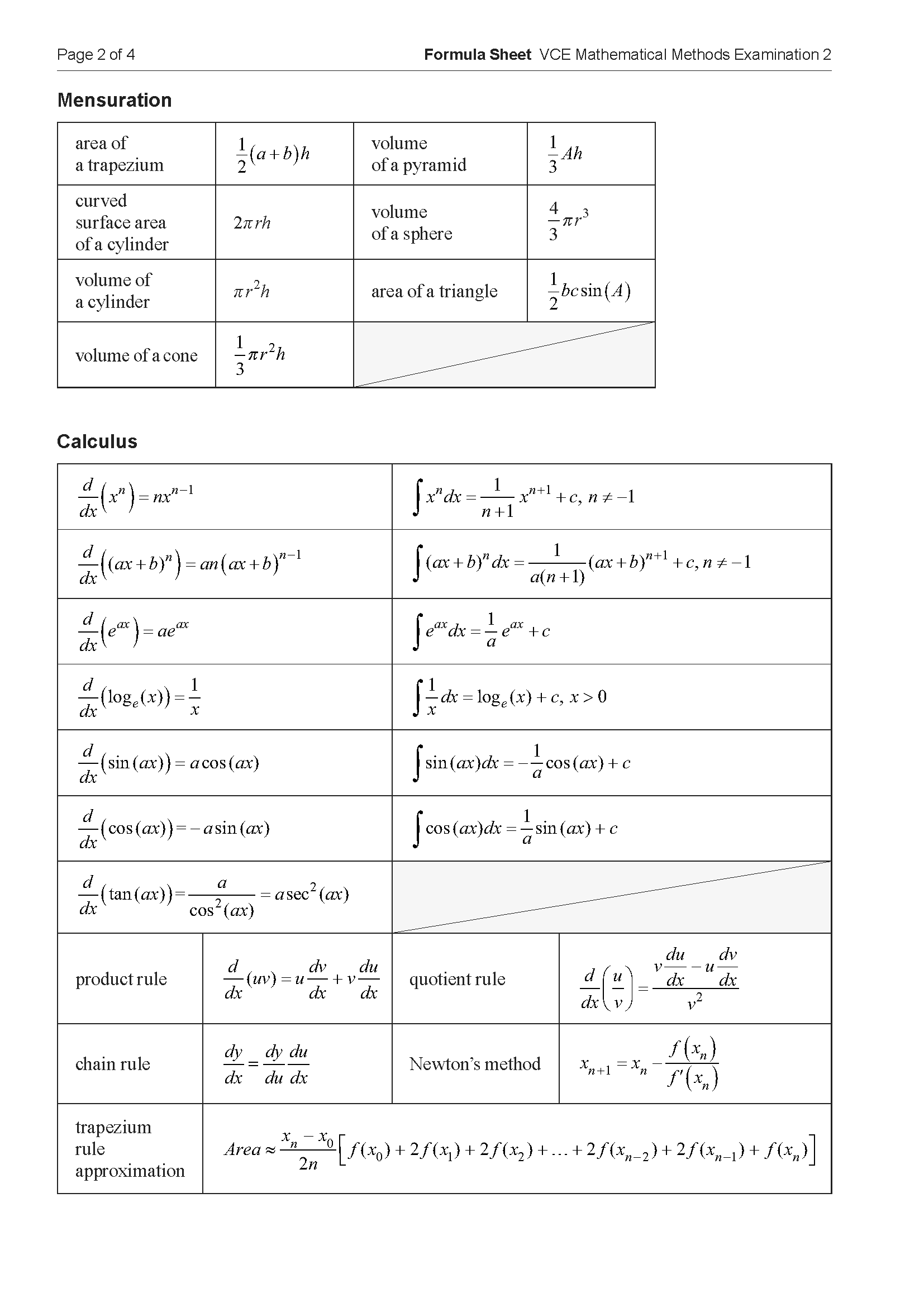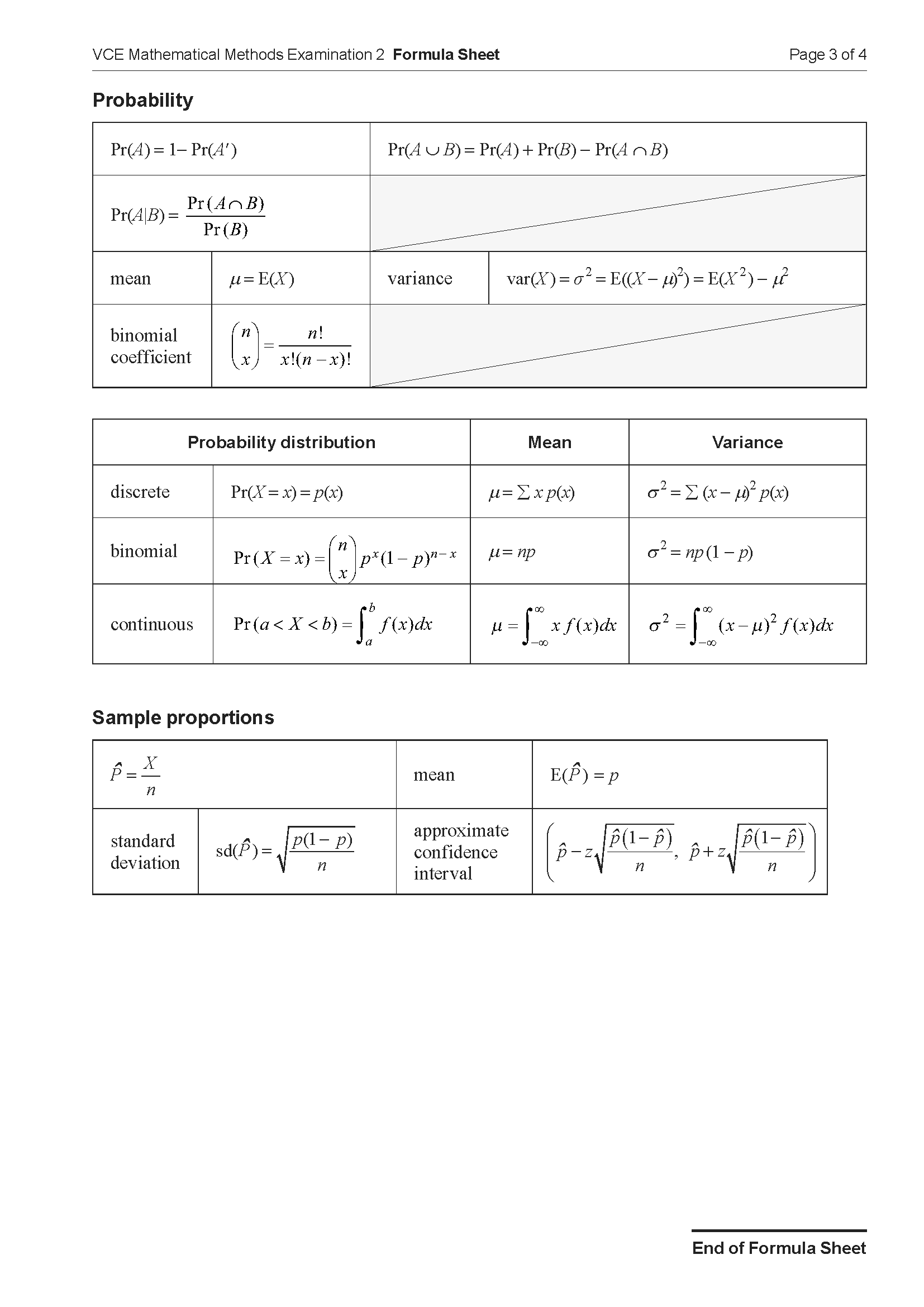2023 VCE Maths Methods Mini Test 7
Number of marks: 10
Reading time: 2 minutes
Writing time: 15 minutes
Section A – Calculator Allowed
Instructions
• Answer all questions in pencil on your Multiple-Choice Answer Sheet.
• Choose the response that is correct for the question.
• A correct answer scores 1; an incorrect answer scores 0.
• Marks will not be deducted for incorrect answers.
• No marks will be given if more than one answer is completed for any question.
• Unless otherwise indicated, the diagrams in this book are not drawn to scale.
Two functions, \( f \) and \( g \), are continuous and differentiable for all \( x \in \mathbb{R} \). It is given that
\( f(-2) = -7, \quad g(-2) = 8, \quad f'(-2) = 3, \quad g'(-2) = 2 \)
The gradient of the graph \( y = f(x) \times g(x) \) at \( x = -2 \) is
- A. −10
- B. −6
- C. 0
- D. 6
- E. 10
The probability mass function for the discrete random variable \( X \) is shown below:
| X | −1 | 0 | 1 | 2 |
|---|---|---|---|---|
| Pr(\(X = x\)) | \(k^2\) | \(3k\) | \(k\) | \(-k^2 - 4k + 1\) |
The maximum possible value for the mean of \( X \) is:
- A. 0
- B. \( \frac{1}{3} \)
- C. \( \frac{2}{3} \)
- D. 1
- E. 2
The following algorithm applies Newton’s method using a For loop with 3 iterations...
\[ \begin{array}{l} \textbf{Inputs:} \quad f(x), \text{ a function of } x \\ \quad\quad\quad\quad df(x), \text{ the derivative of } f(x) \\ \quad\quad\quad\quad x_0, \text{ an initial estimate} \\ \\ \textbf{Define } \texttt{newton}(f(x), df(x), x_0) \\ \quad \textbf{For } i \text{ from } 1 \text{ to } 3 \\ \quad\quad \textbf{If } df(x_0) = 0 \textbf{ Then} \\ \quad\quad\quad \textbf{Return } \text{``Error: Division by zero''} \\ \quad\quad \textbf{Else} \\ \quad\quad\quad x_0 \leftarrow x_0 - f(x_0) \div df(x_0) \\ \quad \textbf{EndFor} \\ \quad \textbf{Return } x_0 \end{array} \]The return value of the function newton(x³ + 3x − 3, 3x² + 3, 1) is closest to
- A. 0.83333
- B. 0.81785
- C. 0.81773
- D. 1
- E. 3
A polynomial has the equation \( y = x(3x - 1)(x + 3)(x + 1) \).
The number of tangents to this curve that pass through the positive x-intercept is
- A. 0
- B. 1
- C. 2
- D. 3
- E. 4
End of Section A
Section B – No Calculator
Instructions
• Answer all questions in the spaces provided.
• Write your responses in English.
• In questions where a numerical answer is required, an exact value must be given unless otherwise specified.
• In questions where more than one mark is available, appropriate working must be shown.
• Unless otherwise indicated, the diagrams in this book are not drawn to scale.
Suppose that the queuing time, \( T \) (in minutes), at a customer service desk has a probability density function given by
\[ f(t) = \begin{cases} kt(16 - t^2) & 0 \leq t \leq 4 \\ 0 & \text{elsewhere} \end{cases} \] for some \( k \in \mathbb{R} \).
a. Show that \( k = \frac{1}{64} \). 1 mark
b. Find \( E(T) \). 2 marks
c. What is the probability that a person has to queue for more than two minutes, given that they have already queued for one minute? 3 marks
End of examination questions
VCE is a registered trademark of the VCAA. The VCAA does not endorse or make any warranties regarding this study resource. Past VCE exams and related content can be accessed directly at www.vcaa.vic.edu.au

